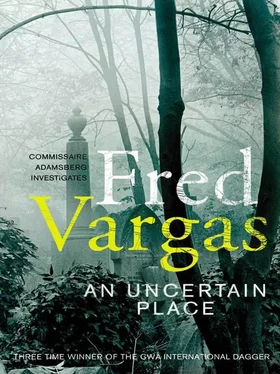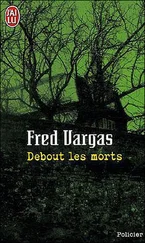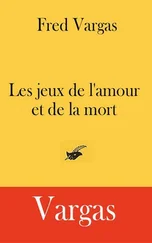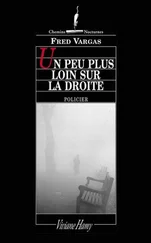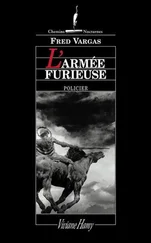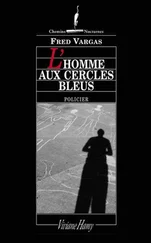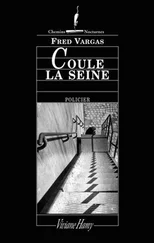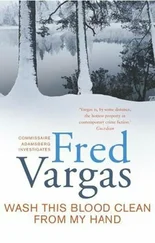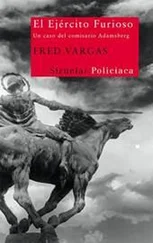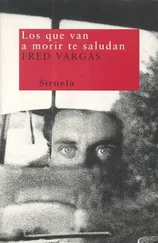‘Look out,’ said Danglard discreetly, ‘it’s not very good.’
‘So let me try to understand,’ said Adamsberg. ‘This DNA on the Kleenex wasn’t from Vaudel senior, Vaudel junior, or Émile. Is that it?’
‘Affirmative,’ said Lamarre, who as a former gendarme had retained his military vocabulary. And since he was also from Normandy, he found it hard to look Adamsberg in the eye.
Adamsberg sipped the wine and shot a glance to Danglard to confirm that yes, the wine had nothing going for it. Still, it wasn’t as awful as the stuff he had drunk through a straw from a carton the night before. He wondered in passing whether it hadn’t been that plonk that had made him sleep so long, whereas he usually needed no more than five or six hours. He broke off a piece from a sandwich on the table – Mordent’s – and slipped it under his seat. ‘For the dog,’ he explained.
He leaned down to check that Cupid was happy with it, then looked back at the thirteen pairs of eyes fixed on him.
‘So we have the DNA of some person unknown,’ he said, ‘presumably the killer. And you sent this off to the databank without thinking it would amount to anything, but you hit the jackpot. You’ve got the killer’s name and photo, because he’s on file.’
‘Yes,’ Danglard confirmed in a low voice.
‘And you know where he lives.’
‘Yes,’ said Danglard again.
Adamsberg realised that this rapid conclusion was troubling his colleagues, generating a strong emotion of some kind, as if they had had to make a forced landing. But the air of general embarrassment, even guilt, disconcerted him. Somewhere the plane had gone off the runway.
‘So,’ he continued, ‘we know his address, maybe we know where he works, his family, friends. And you found that out less than twenty-four hours ago. So we check his whereabouts, we move in cautiously and we’ve got him.’
As he spoke he realised that he was completely mistaken. Either they were not going to catch the suspect, or they had already lost him.
‘You can’t have missed him, unless he knows he’s been identified.’
Danglard put his baggy briefcase on his knees, the one usually bulging with bottles of wine. He pulled out a sheaf of newspapers and passed one over to Adamsberg.
‘Yes, he does know,’ he said in a weary voice.
LAVOISIER, HEAD SURGEON AT THE HOSPITAL, WAS LOOKING down severely at his patient, as if he blamed him for his own condition. This sudden attack of fever wasn’t supposed to happen. It was caused by incipient peritonitis which would gravely compromise his chances of recovery. He was on powerful antibiotics, and the sheets were changed every two hours. The doctor patted Émile’s cheeks several times.
‘Wake up, old chap, we’re going to have to hook you up.’
Émile obeyed painfully and looked up at the little man in white, to him a slightly fuzzy silhouette.
‘I’m Professor Lavoisier, like Lavoisier,’ said the doctor. ‘Hang on in there,’ he said, patting the cheek again. ‘You’re supposed to be nil by mouth, but you must have swallowed something secretly. A piece of paper, something you didn’t want us to find?’
Émile moved his head left to right. Negative.
‘Come clean, mon vieux . I don’t care if you’ve got something illegal in here. It’s your stomach I’m worried about, not your criminal record. Understand? You could have killed all four of your grandparents and it wouldn’t change the problem I’ve got with your stomach. See what I mean? I’m quite neutral. So come on, did you swallow anything?’
‘Wine,’ Émile whispered.
‘How much?’
Émile indicated about five centimetres with finger and thumb.
‘Or two or three times that, no?’ Lavoisier guessed. ‘Ah, that’s helpful, now I can see a bit more clearly. Because I don’t care how much you drink as a rule, that’s your business. But right now, nothing at all. So where did you get this wine? Under the other patient’s bed?’
Negative. Vexed.
‘Don’t drink much. Good for me circulation though.’
‘Oh, you think that, do you? And where did you dig that up?’
‘They told me.’
‘Who? The guy over there with the ulcer?’
‘No, wouldn’t believe him, he’s too dumb.’
‘Yes, true, he is dumb,’ said Lavoisier, ‘so who?’
‘White coat.’
‘No, impossible.’
‘White coat, mask.’
‘No doctor on this floor wears a mask. Nor do the nurses or paramedics.’
‘White coat. Made me drink, good for me.’
Lavoisier clenched his fist as he remembered Adamsberg’s strict injunctions.
‘All right, mon vieux ,’ he said, ‘I’m going to call your pal the cop now.’
‘That cop,’ said Émile, lifting his arm. ‘If I’ve had it, tell him something.’
‘You want me to give Adamsberg a message?’
‘Yeah.’
‘Take your time.’
‘Code word. On a postcard too. Same thing.’
‘Right,’ said Lavoisier, writing a few words on the temperature chart. ‘That it?’
‘Dog, watch out.’
‘Watch out for what?’
‘Allergic to peppers.’
‘That’s all?’
‘Yeah.’
‘Don’t worry, I’ll pass it all on.’
Once he was in the corridor, Lavoisier called the tall paramedic, André, and the small one, Guillaume.
‘From now on, take it in turns to watch his door, don’t leave him alone for a second. Some bastard has got him to swallow something in a glass of wine. Wearing a white coat and a mask, simple as that. Immediate stomach pump, tell the anaesthetist and Dr Vénieux, it’s make or break.’
DANGLARD ASKED ADAMSBERG TO STAY BEHIND WITH HIM in the cafe, and pulled together the newspapers spread all over the table. The most explicit had published a photograph of the killer on the front page. A dark-haired young man, with angular features, eyebrows meeting in a line across his face, a prominent nose, small chin and large expressionless eyes. ‘THE MONSTER CHOPPED UP HIS VICTIM’S BODY!’ shouted the headline.
‘So why didn’t you tell me all this as soon as I got here? The DNA, the leak to the press?’
‘We were waiting,’ said Danglard. ‘We hoped we might be able to catch him instead of having to face you with this mess.’
‘Why did you ask the others to go back to the office?’
‘Because the leak came from inside the squad, not from the lab or the databank. Read the article, and you’ll see that there are details nobody but us could have known. The only thing they don’t publish is the killer’s address, they’ve got just about everything else.’
‘And where’s that?’
‘Paris, 18th arrondissement, 182 rue Ordener. We identified it at eleven this morning, the team went out and – there was nobody there of course.’
Adamsberg frowned. ‘But you know that’s Weill’s address? Number 182?’
‘Our Weill, our divisionnaire that was?’
‘Yes.’
‘What do you think? That the killer did it on purpose? That he liked the idea of living in the same apartment building as a senior policeman?’
‘He could even have taken the risk of getting to know Weill as a neighbour. It’s quite easy, he holds open house on Wednesdays, and you get good eats.’
Ex- Divisionnaire Weill was, if not exactly a friend, at least one of Adamsberg’s few highly placed protectors at the quai des Orfèvres. He had retired early from the force, on the pretext of back pains aggravated by his being overweight, but really in order to devote himself to his study of poster art in the twentieth century, on which he had become a world authority. Adamsberg had a meal with him two or three times a year, sometimes to settle something administrative, sometimes just to listen to him talk, reclining on a shabby couch which had once belonged to Lampe, Immanuel Kant’s valet. Weill had told him that when Lampe wanted to get married, Kant had dismissed him along with his couch, and had pinned on the wall a note saying ‘Remember to forget Lampe’. Adamsberg had been struck by this, since he would have written ‘Remember not to forget Lampe’.
Читать дальше
